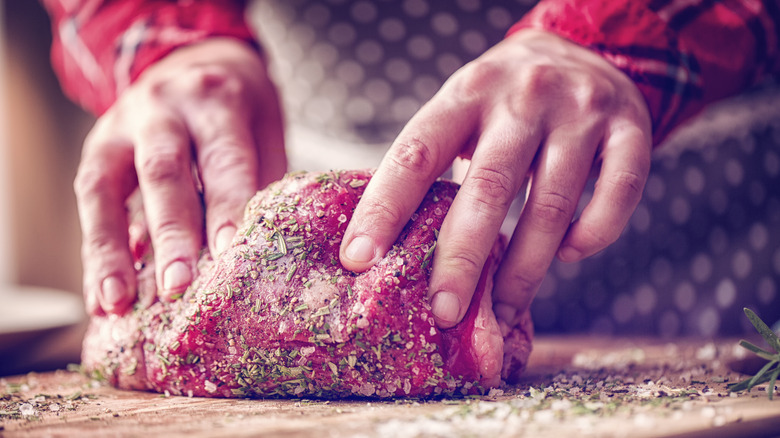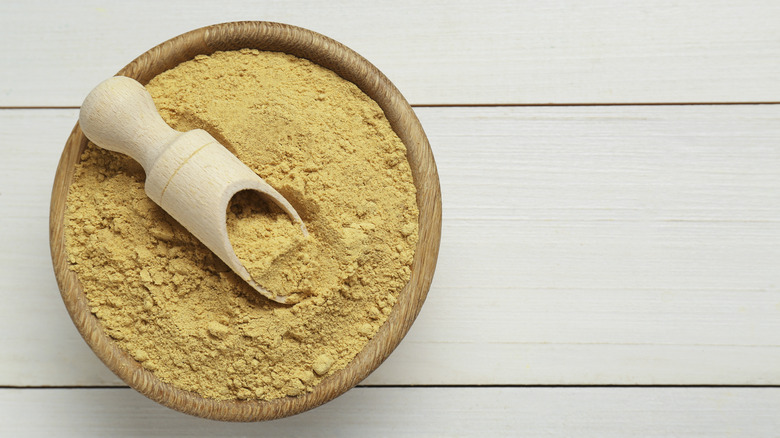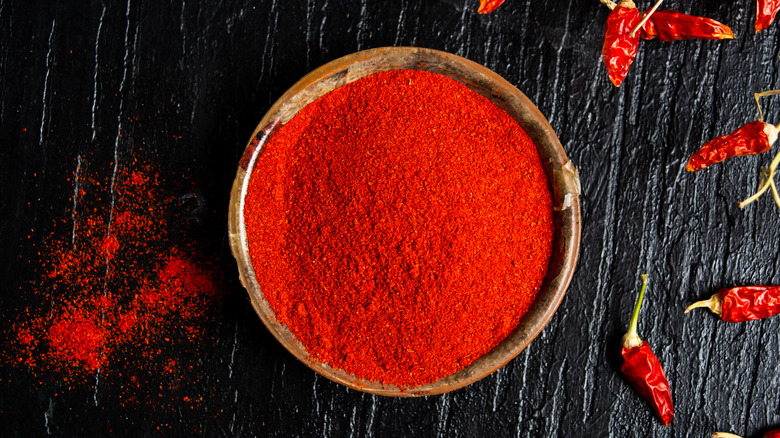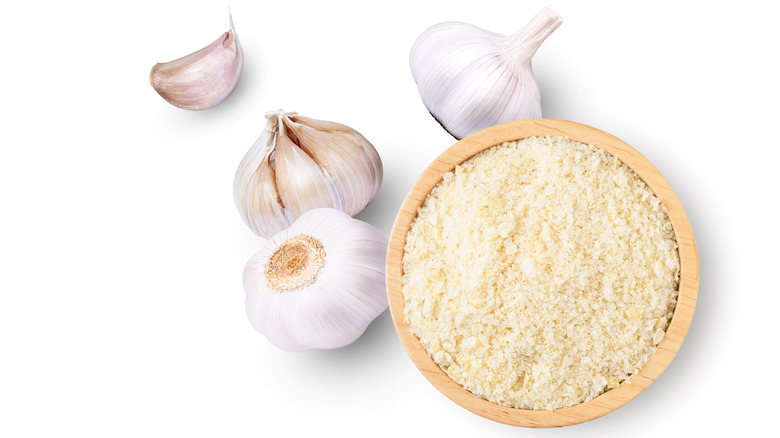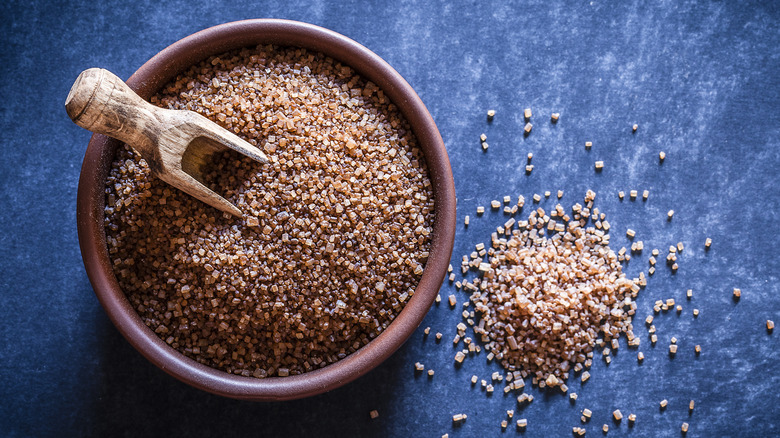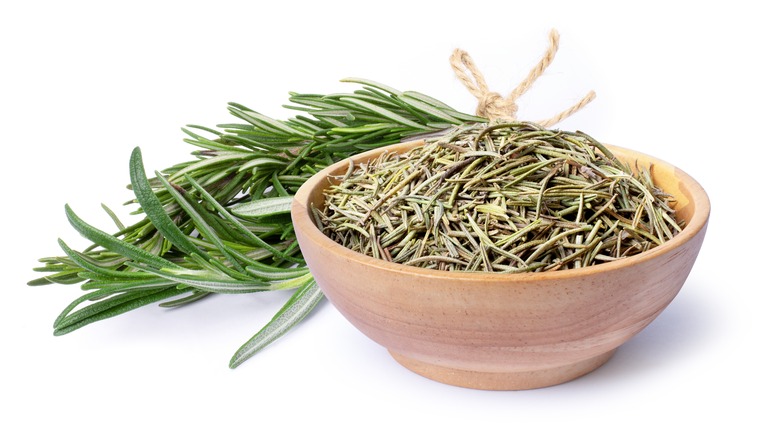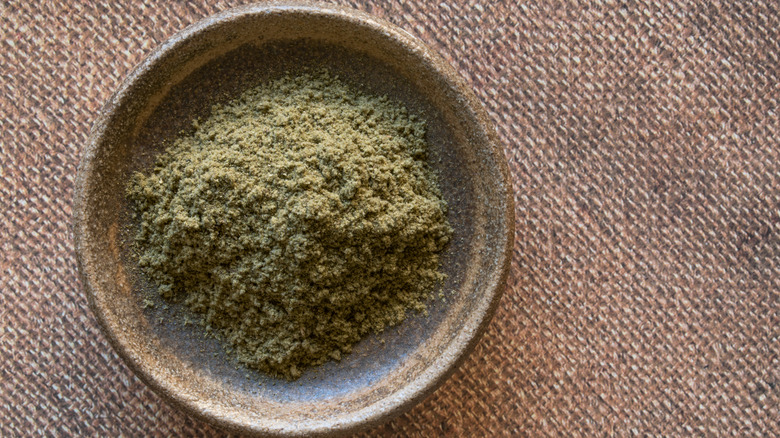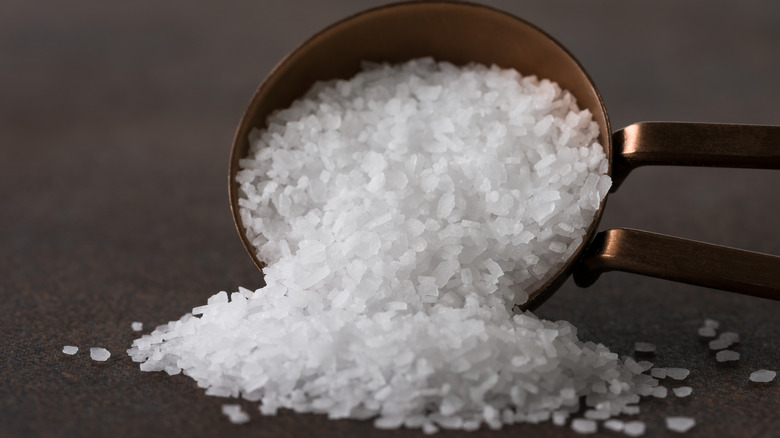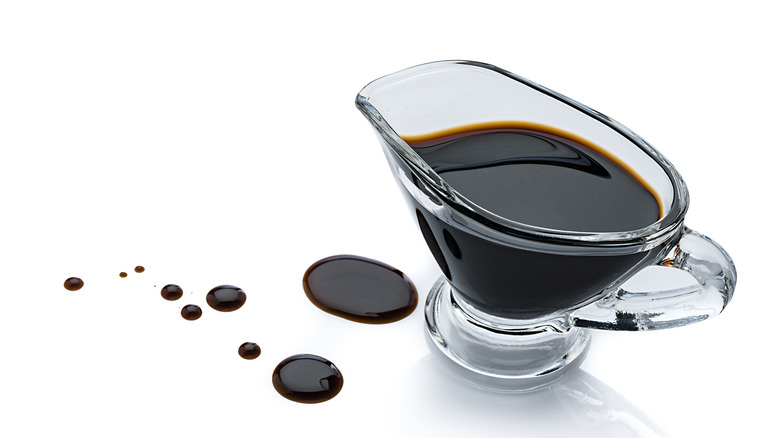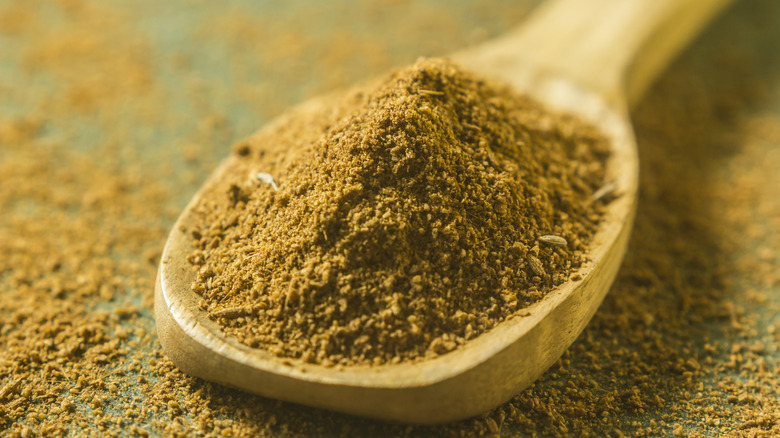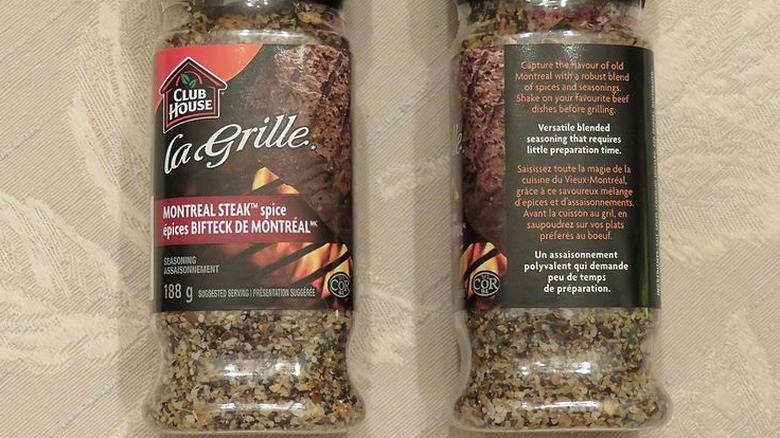10 Delicious Seasonings For Roast Beef
Before the introduction of crockpots, there were no workarounds to a day spent in the kitchen watching a pot simmer; that's when the term Sunday roast came into play. It connotes a roast beef dinner, the pinnacle of an English feast and a standby all over the world via different adaptations. Adored for its versatility, roast beef might be even better on day two, smacked between two pieces of bread.
While any cut of beef can be roasted, technically speaking, there is a time and place for everything in the kitchen. Among the best cuts of meat for roast beef are the eye of round roast, top round, sirloin tip roast, and bottom round rump.
Dozens of seasonings can take beef from one continent to the next in terms of influence, yet that succulent taste and unmatched flavor never waver. A perfect roast takes time, effort, and, most importantly, the right blend of spices. Finding that perfect mish-mosh of seasonings for a roast beef dinner, however, is about so much more than just pops of flavor. The secret to seasoning like a pro is two-fold; salt and acid. The job of spices isn't to lead the flavor, but to bring out the natural flavors of each ingredient. While spices amp up the taste, they also work to tenderize the meat. There are always new spices with which to experiment, but these classics are reliable in both taste and utility.
Mustard powder
Roast beef may be a staple in American households, but England has a deep connection with the traditional recipe. The British revel in their Sunday roasts, grazing picnic-style with sides and accouterments, one almost always being English mustard.
They clearly know what they're doing; zesty mustard and savory roast beef are a winning combination. While creamy mustard is a must on a roast beef sandwich, mustard powder is also an excellent seasoning for the meat itself. Not only does mustard powder offer a zesty coating, but it's commonly used to soften meat. Rumor has it that the secret to a perfect smash burger isn't fine cuts of beef chuck, but mustard.
In-N-Out tenderizes its beef with yellow mustard, but ground mustard in particular is a natural emulsifier. It's easy to dismiss the heat mustard can produce, but it builds up and adds a sharp bite no other spice can match. Mustard and peppercorn have become a popular dry rub for beef; the peppery notes mesh with the zesty mustard to create an entirely new flavor profile. While ground mustard is a surefire way to add that pure flavor right from the seeds, Dijon mustard has the bonus of zesty vinegar and tenderizing properties.
Paprika
There are smokey versions of paprika, sweet, extra spicy, and countless others; Hungarian paprika alone comes in eight varieties. When seasoning beef for the ultimate roast, any kind will do, but opting smokier delivers a more unique touch. A paprika-spiced roast offers a nice kick, but it's the leftover roast beef sandwiches that will really sing.
Paprika's many flavor profiles make it an adaptable spice, but that doesn't mean it is hard to recognize. Whenever that smoky, fiery punch tickles the tongue, it's readily apparent. On the off chance you don't catch the taste right away, you won't miss the vibrant red hue. For sure a complex spice, it has become surprisingly commonplace. As an added bonus, much like other essential spices, paprika is likely already tucked away in any pantry.
Garlic powder
A world without garlic isn't a world worth living in, and that includes garlic powder. Nothing compares to fresh garlic, but garlic powder deserves a better reputation, as it is too quickly judged as merely a cooking shortcut rather than an essential ingredient. Garlic powder should never be used in place of a fresh clove, but it has its own strengths. When it comes to a beef rub, garlic powder has the ability to coat the roast in a way even finely-diced garlic simply cannot. A dry rub needs garlic powder like peanut butter needs jelly.
The deep flavors of garlic can take even the most bland dishes from blah to showstoppers, and roast beef is no different. It harmonizes with every other seasoning imaginable, whether sweet or spicy, making it the perfect complement to a seasoning blend. Garlic's bold umami notes taste as if it was made to complement beef's richness, as it adds a distinct taste while cutting through the fat.
Brown sugar
Brown sugar is in the usual lineup for bakers, but it plays some revolutionary duties in savory dishes as well. Sugar's sweetness balances out the buttery, bold flavors of a roast in a unique way while helping bind all the components together. Searing the cut of beef in a pan before popping it in the oven will ensure a beautiful crust that keeps the meat juicy, and sugar can help. Adding a teeny bit of sugar will allow the beef to develop the ideal texture as it cooks.
Sweet and salty is not a new phenomenon, but it's often associated with movie snacks and munchies, rather than main courses. The thought of sugar in a salty dish may shock some, but it is a common ingredient in classic sauces and seasoning blends around the globe. A sprinkle of sugar is often added to tomato-based pasta sauces, stir-fries, curries, and countless other recipes. While white sugar or other finely ground sugars will serve the same purpose in theory, brown sugar is the best option as it doesn't burn quickly. The heartier texture makes for a better sear, with substantial caramelization.
Rosemary
When an iconic roast beef supper is pictured, the visual probably includes a sprig or two of rosemary. The herb frequently serves as garnish for a beautiful roast, injecting its strong flavor where it can. Yes, the branches are dainty, but the herbaceous savor is substantial. While the fresh herb is always an excellent touch, dried rosemary is well suited for a dry rub, as it's easier to massage into the cut of meat. A slow-roasted eye of round isn't complete without the distinct, forest-like essence rosemary adds.
Rosemary has undeniable earthy notes that highlight the richness of the beef without subtracting from it. While rosemary pairs excellent with roast beef, it also pairs well with nearly all other seasonings. Rosemary is one of the top seasonings for roast beef due to its pronounced taste, but also because it plays well with other flavors. The versatility of rosemary makes it a breeze to cook with, as there's little with which it can clash.
Sage
Sage has a rich history, once celebrated for being a powerful natural remedy, today recognized for its taste. Sage aids in digestion, has soft, delicate leaves that almost look too pretty to eat, and deserves to be appreciated on the stove. There are two types to choose from, rubbed sage and ground sage.
The distinct, fuzzy leaves are rubbed together to create a fluffy-like powder in the rubbed sage. Ground sage, on the other hand, is made by grinding the sage plant in its entirety. Whichever you prefer, the latter delivers a more potent flavor, making it the ideal choice for seasoning roast beef. Ground sage shares an herbaceous flavor with many of its peers, but some characteristics are unique only to this spice. Sage has a lemony essence, with a layer of peppery mint that really make the natural flavors of beef come to life.
Kosher salt
Kosher salt is an absolute necessity when roasting beef. Aside from the obvious allures, salt works double time to break down muscle tissue and draw out extra moisture from the meat. Salt is already in most seasoning repertoires, but Kosher salt should specifically be on a counter when prepping a roast. The larger salt crystals absorb moisture faster than the smaller grains of typical table salt. Plus, they're easier to spot, which means less chance of oversalting the dish.
When cooking beef, the goal isn't to eliminate the fat but to make sure it does its job properly. Salt helps dissolve tough bits of fat, thereby softening the meat until it reaches a fall-off-the-bone, melt-in-the-mouth level of tenderness. Once the salty fat dissolves into the bubbling cooking juices, dinner is ready. Tons of seasonings amp up the flavor of beef, but salt can make or break a dish.
Balsamic vinegar
Vinegar is another magical ingredient more of a secret tool than flavoring, but nevertheless a fine roast beef seasoning. A tangy vinegar works as part meat tenderizer, part marinade. The acidity combats the proteins, breaking them down to then bind together and retain all the juicy goodness the meat has to offer. The result is a perfectly tender, succulent roast.
As incredible as dried spices are, none can quite accomplish what vinegar can. Any vinegar will get the job done, but with all the varietals in the world, why not kill two birds with one stone and add a punch of flavor? Balsamic is the most suitable choice given its natural brightness. If opting for balsamic vinegar, skip the brown sugar; balsamic vinegar will provide just the right amount of sweetness. A little goes a long way with balsamic, so keep in mind that the sweetness deepens with the cooking time.
Cumin
Cumin is a powerful, earthy spice that can take any dish in a whole new direction, roast beef included. It's a common ingredient in dry rubs, used on all kinds of meat, but it does wonders when coupled with beef. It has a naturally nutty flavor that intensifies the richness of the meat, bringing forward any peppery or smoky flavor notes. It is a member of the parsley family, which may come as a surprise to some, but they share hints of similarities, like that citrusy nuance.
Being a potent star of the Indian spice blend garam masala, cumin is often deemed fit for curries, chilis, and other dishes of Western Asia, but the spice can enrich a wide range of recipes from everywhere. If it wasn't for the exorbitant price of cumin before the 20th century, it probably would have become a much more common cabinet spice in the U.S. sooner. Aside from bold flavors, cumin has been said to bring good fortune as well. According to folklore, carrying cumin seeds throughout one's wedding ceremony will lead to a lifetime of happiness, so a cumin-rubbed roast might be the most perfect wedding menu choice.
Montreal steak seasoning
Montreal steak seasoning, or Montreal steak spice, is a popular Canadian spice blend that is almost a mix of everything else on this list, so obviously it is a primo choice when seasoning roast beef. Thanks to the pre-mixed concoction, prep time can be cut down without sacrificing any of the flavor. The robust blend of aromatics is sure to spice up a roast. Sizzling roast beef seasoned with Montreal steak spice will be hard to resist hot right out of the oven, but try to keep servings small the first go-around. The flavors really lend themselves to those inevitable, delightful roast beef sandwiches.
The seasoning mix is typically composed of black pepper, red pepper, salt, garlic, onion, and paprika. Some packaged brands, such as Club House La Grille, have other additions like a hint of mustard, but many recipes are kept secret. As Club House says, it is the "spice that made steak famous."
